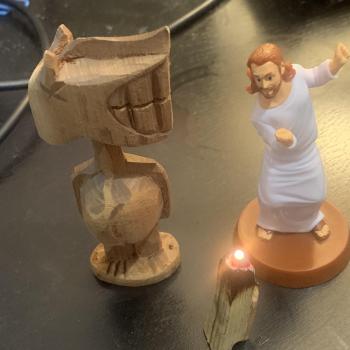Like many annual conferences of the United Methodist Church, the Virginia Conference is considering a resolution to change the language in the Book of Discipline about homosexuality. In an effort to have a better conversation than convention hall speeches, about 300 of us gathered last night to listen to representatives from each side give speeches and then split up into groups of 8 to share our convictions and stories with each other. Our conversation gave me a lot of hope in a time when we need more hope as United Methodists, so I wanted to share my observations from it.
1) You can’t tell people’s views on sexuality from their haircuts
I was hoping to find a circle of 8 with people who thought differently than me so I looked around the room for guys with crew cuts. Upon joining a group with two crew cut guys, I found that one of them was explicitly LGBT-affirming and the other had an ambivalently moderate position in which he said he could clearly see the fruit of the Holy Spirit in the LGBT Christians who had served in as leaders in his congregation but he was worried about driving away the conservatives with the resolution. There were some women in our group who dressed and looked kind of “granola-ish” like the old liberal Christian ladies I used to do anti-sweatshop protests with in the Latin American solidarity movement a decade ago. I was surprised to hear one of the “granola-ish” seeming women articulate a traditionalist perspective. She was trembling as she spoke. She was as dignified and respectful as she could have possibly been. I wanted to give her a big hug.
2) There absolutely aren’t only two sides, two ways to read the Bible, etc.
Nobody who participated in the small group conversations could have said afterward with any integrity that this is a debate between two “fundamentally different” ways of viewing the Bible as either a “human” document or “divinely inspired.” No one could have said it was a debate between people who value “civil rights” and those who value “holiness” or between “bigots” and “heretics.” It was clear that the traditionalists who spoke weren’t just saying they “loved” LGBT people; they had real relationships with real people and experienced real pain at the tension between their beliefs about what the Bible teaches and those relationships. It was also clear that the progressives who spoke cared very deeply about the Bible’s authority and obeying God’s will. In my small group, there were many overlapping agendas, investments, and worries that could not be simply bifurcated into a “liberal” and “conservative” side. We were all surprisingly moderate actually. We all shared a deep longing for peace and unity in our church as well as a recognition that the church’s witness about sexual holiness in a crazed oversexed culture is critically important.
3) We are so much more tender and hospitable in person than online
What touched my heart the most about our conversation was seeing the pains that we took to be careful and respectful of each other in how we spoke. It was clear that our stammering came from more than just fear and awkwardness; there was a genuine yearning not to be hurtful to others. This was particularly evident as we learned where other people were coming from. We tried to affirm things that were said by people before us particularly if they seemed to be on “the other side.” What was completely absent was the strident, “my way or the highway” tone that overtakes us so easily when we’re looking at a laptop screen instead of other people’s faces.
4) Whatever happens, it need to be because we listened to God together
Bishop Cho shared in his episcopal address that he has charged our Connectional table with facilitating prayerful conversations throughout the conference about sexuality. My hope and prayer is that whatever happens with the mostly symbolic resolution tomorrow, we will not wriggle ourselves out of having these critically important conversations. I hope they will be holistic conversations about sexual holiness for the sake of our actual lived discipleship rather than ideological debates about homosexuality as an issue. I believe that God has much to teach us about sexuality that transcends our stance on homosexuality itself. Just like Jesus consistently refused to let the Pharisees pin him down with either/or questions and instead came back at the Pharisees with convicting questions of his own, I think God has a few convicting questions for those of us who think we’ve got everything figured out whichever side we’re on.
We need to enter into conversation with a posture of open-handed listening rather than seeking to persuade and argue. I don’t want anyone to cave and agree with me for any reason other than because they’re obeying God. If it’s out of fear of conflict or conformity to worldly trends, then it’s not of God. I am trying my best to obey what God has commanded me to speak based on my journey through the Bible and my experience being mentored by LGBT Christians whose superior holiness was irrefutably obvious. But because I’m a sinner who is part flesh and part spirit, I cannot trust myself 100%. My discernment needs to happen in conversation with others who are seeking God’s will and have very different interpretations of scripture and personal discipleship journeys. Whatever we do, let it be because we listened to God together.











